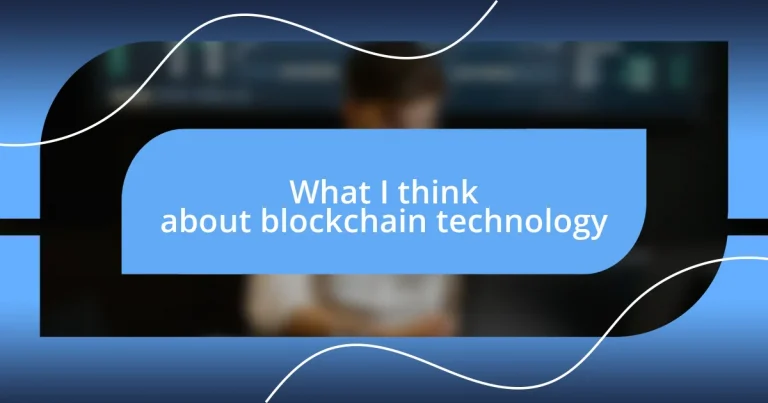Key takeaways:
- Blockchain technology fosters transparency and trust by decentralizing data management, eliminating the need for intermediary roles.
- It has significant potential to disrupt various industries with benefits such as operational efficiency, enhanced security, and improved accountability.
- Challenges like scalability, regulatory uncertainty, and complexity hinder widespread blockchain adoption, yet future trends like DeFi and green technologies show promise for the industry.
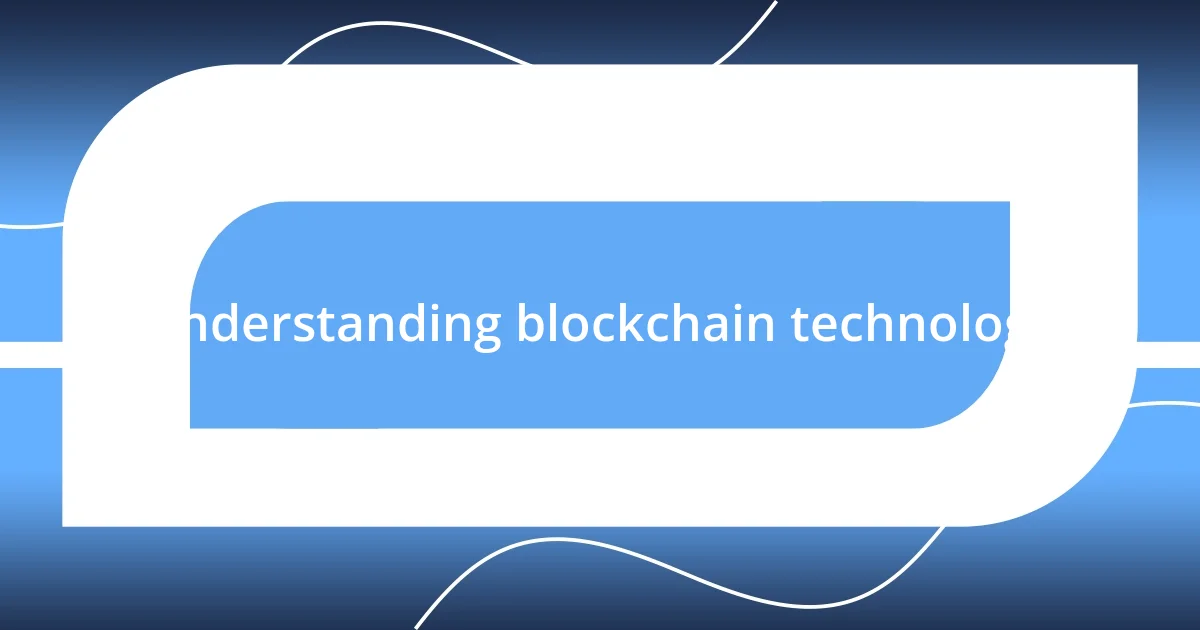
Understanding blockchain technology
Blockchain technology, at its core, is a decentralized digital ledger that records transactions across multiple computers. What fascinates me about it is how this transparency can foster trust; no single entity has control over the data. Have you ever thought about how many middlemen we rely on in traditional systems? In blockchain, those roles dissolve, which can lead to greater efficiency and lower costs.
When I first encountered blockchain, I was struck by its potential to revolutionize various industries beyond just cryptocurrencies. Imagine being able to verify the authenticity of products, like luxury goods or pharmaceuticals, without having to take anyone’s word for it. It brings a level of certainty that feels refreshing in a world filled with doubts.
As I reflect on the complex layers of blockchain, I often ponder whether its benefits outweigh the challenges it faces, like scalability and energy consumption. Every time I hear a success story about businesses streamlining operations thanks to blockchain, I can’t help but feel a spark of excitement. Do you see the same promise? It seems like we’re on the brink of something transformative, pushing us toward a more accountable and transparent future.
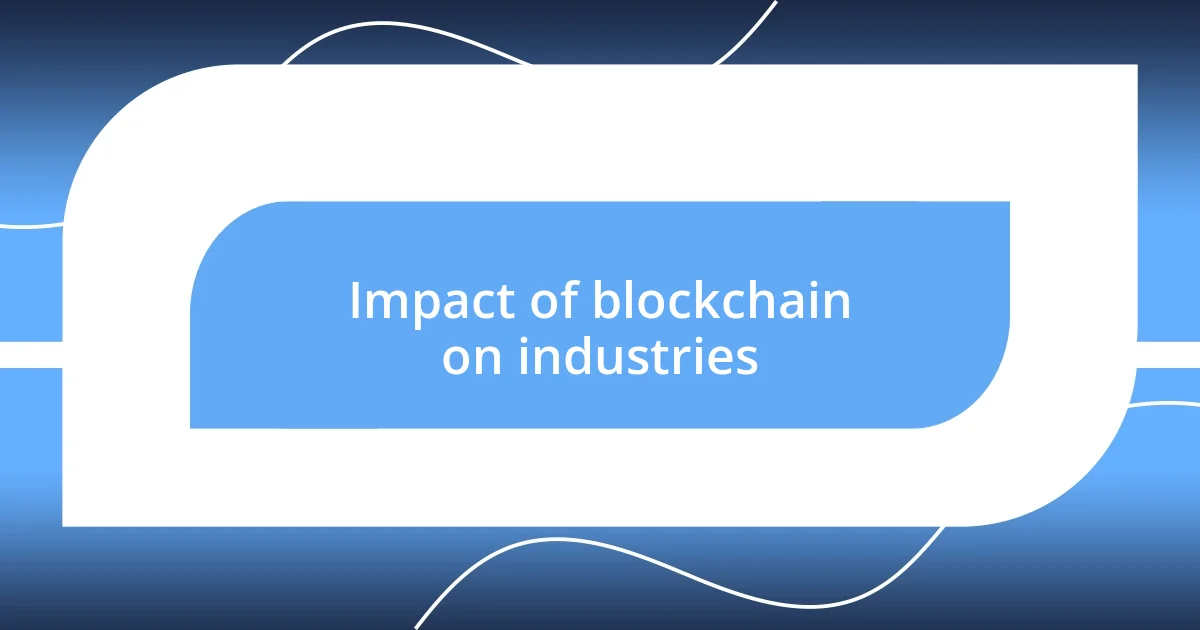
Impact of blockchain on industries
When I think about the impact of blockchain on various industries, it’s clear that the technology has the potential to disrupt the traditional models we’ve come to rely on. For example, I’ve seen how supply chain management can benefit from blockchain’s traceability features. Imagine a straightforward way to track a product from its origin to the store shelf; it not only ensures authenticity but also enhances accountability among suppliers.
Consider these notable impacts of blockchain across industries:
– Finance: Streamlined cross-border payments, reducing transaction times and fees.
– Healthcare: Improved patient data management, ensuring better data accessibility while maintaining privacy.
– Real Estate: Simplified property transactions, reducing paperwork and eliminating fraud.
– Entertainment: Enhanced copyright protection for creators, providing more transparent revenue distribution.
– Retail: Increased customer trust through verified product origins and supply chain transparency.
Every time I hear about a new application in one of these sectors, I find myself imagining how much smoother those processes would be. It’s inspiring, and honestly, a bit exhilarating to think about how we might one day look back on these innovations as pivotal moments in our economic evolution.
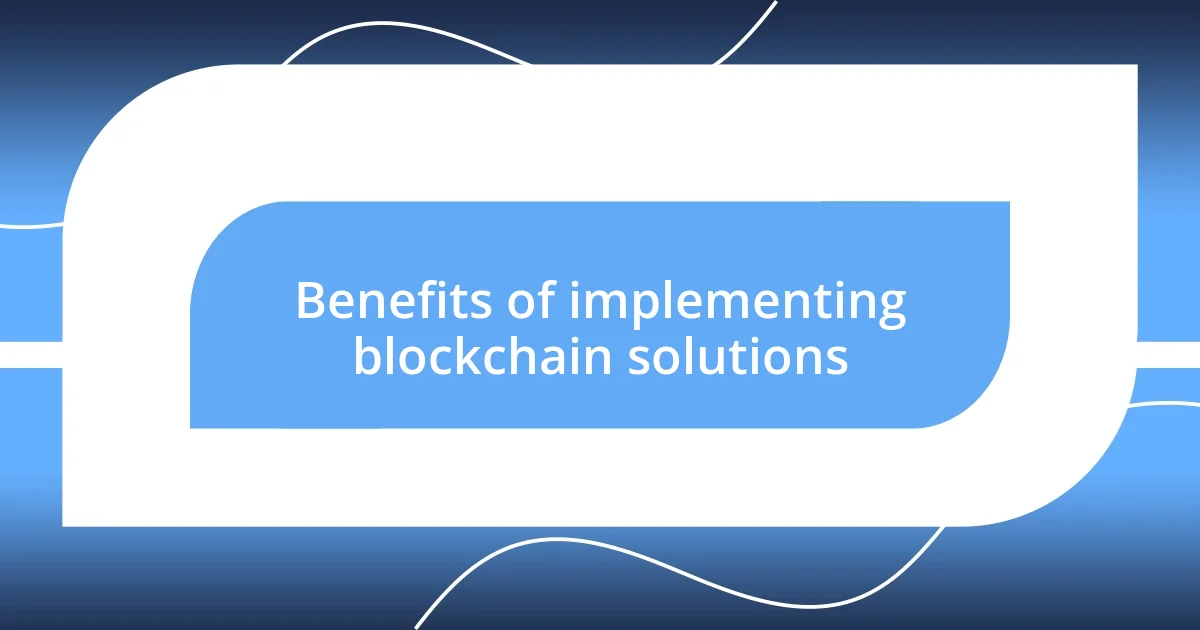
Benefits of implementing blockchain solutions
The benefits of implementing blockchain solutions are numerous and can significantly enhance operational efficiency. I recall a conversation I had with a logistics manager who shared how blockchain improved his company’s shipping processes. With real-time tracking on a decentralized ledger, delays were minimized, and accountability was heightened. Who wouldn’t appreciate knowing exactly where a shipment is at any point in time?
Another compelling advantage of blockchain is its capacity to enhance security. By using cryptographic techniques, blockchain creates a nearly immutable record of transactions. I remember a tech startup that integrated blockchain for securing customer data. The peace of mind that came from knowing their users’ information was encrypted and protected from unauthorized access was palpable. How reassuring is it to know that sensitive data is stored in such a secure manner?
Finally, the transparency that blockchain provides cannot be overstated. When stakeholders can access the same data in real-time, it establishes a level of trust that’s often missing in traditional systems. I once attended a webinar where a speaker discussed a blockchain project aimed at improving voting systems. The idea that every vote could be securely recorded and openly verified struck me as a monumental step toward enhancing democratic processes. Wouldn’t that make you feel more confident about participating in elections?
| Benefit | Description |
|---|---|
| Operational Efficiency | Streamlines processes by reducing delays and enhancing accountability. |
| Security | Employs cryptographic techniques to protect sensitive data, ensuring a high level of security. |
| Transparency | Facilitates real-time access to data, fostering trust among all stakeholders. |
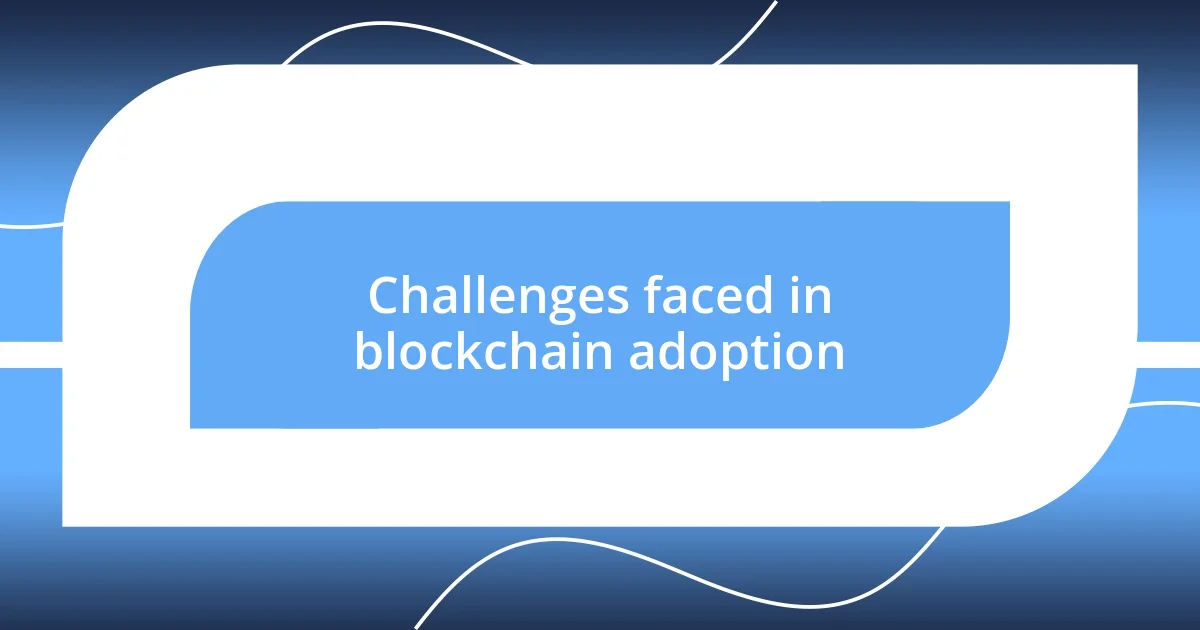
Challenges faced in blockchain adoption
When I ponder the challenges of blockchain adoption, scalability often emerges as a significant concern. I remember attending a tech conference where a leading expert discussed how some blockchains struggle to handle large volumes of transactions simultaneously. It made me think: How can we trust a system that can’t keep pace with demand? The reality is that as businesses aim to integrate blockchain on a larger scale, ensuring it can handle that load will be crucial for widespread adoption.
Another barrier I frequently encounter is the issue of regulatory uncertainty. Just recently, I was chatting with a friend who operates in the fintech space. He expressed frustration with navigating a patchwork of regulations that seem to change from one day to the next. I empathized with him; how can companies confidently invest in blockchain when the right legal framework is still hazy? This uncertainty can stifle innovation and deter potential adopters from jumping in.
Furthermore, the complexity of blockchain technology itself can’t be overlooked. I recall a workshop I attended on blockchain basics where even seasoned professionals struggled to grasp key concepts. If experts find it challenging, how can we expect the average business leader to understand and embrace this technology? This gap in knowledge might be one of the biggest roadblocks we face, keeping many organizations at bay despite the potential advantages that could await them.
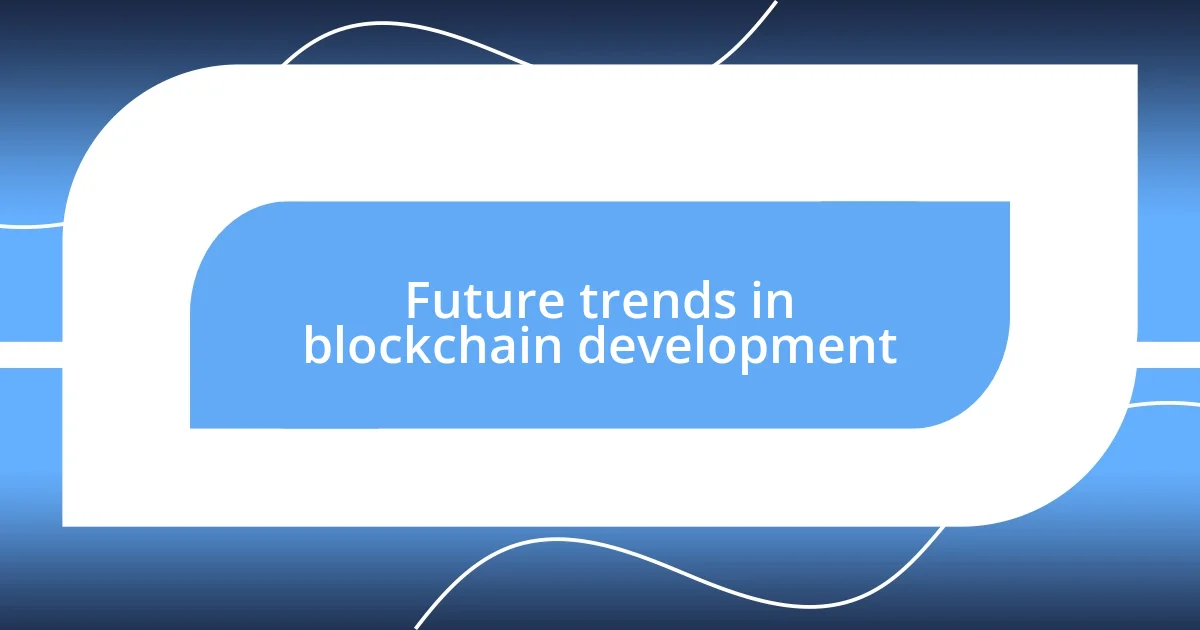
Future trends in blockchain development
As I look ahead to the future of blockchain development, I can’t help but feel excited about the rise of interoperability between different blockchain networks. I recently worked on a project where we faced challenges integrating data from multiple blockchains. It made me realize how vital it is for those networks to communicate effortlessly. Imagine being able to transfer assets or information across various blockchains without friction—this could revolutionize sectors like finance and supply chain management!
I also see a growing trend in the use of decentralized finance, or DeFi, which is gaining traction. During a recent discussion with a group of developers, we explored how DeFi platforms are changing traditional financial models. Can you imagine a world where anyone, anywhere, can access financial services without intermediaries? It feels empowering to think about the potential for economic inclusivity that DeFi could offer.
Moreover, I find the shift toward green blockchain technology particularly compelling. Sustainability is a significant concern for many of us today. While attending an environmental tech summit, I learned about innovative projects that use blockchain to track carbon credits and promote clean energy. How rewarding would it be to support eco-friendly practices while leveraging the advantages of blockchain? Moving in this direction could significantly enhance the appeal of blockchain solutions across various industries.
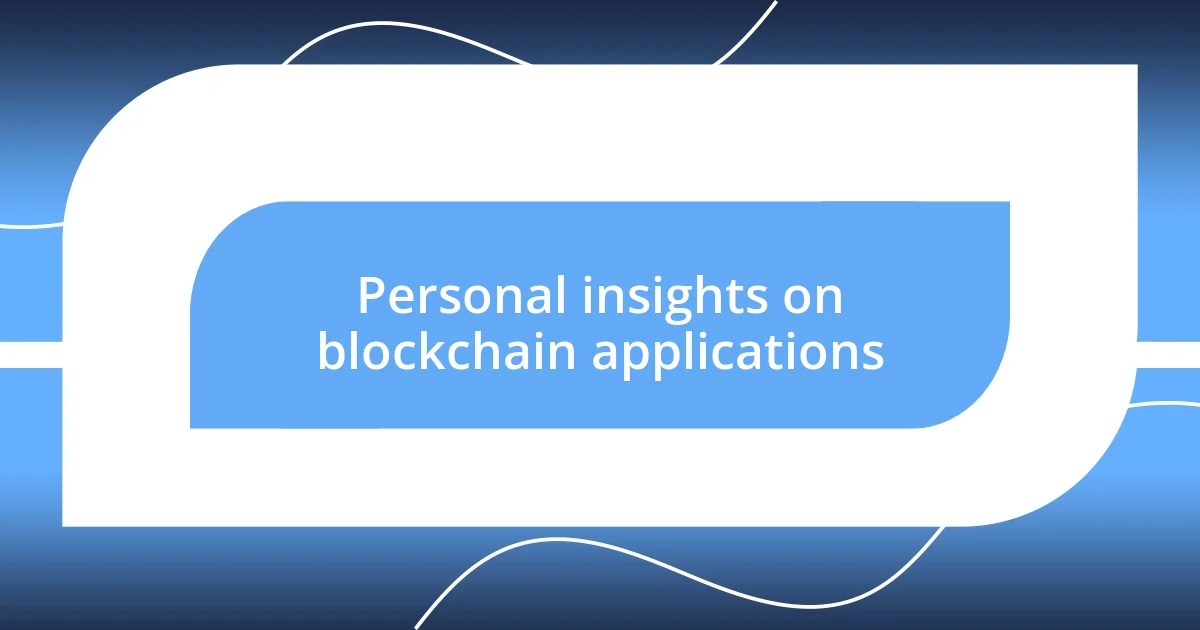
Personal insights on blockchain applications
When I think about blockchain applications, one area that truly resonates with me is supply chain management. I remember visiting a manufacturing facility where they showcased a blockchain solution that tracked every step of their product lifecycle. It was astonishing to see how transparency led to reduced fraud and enhanced consumer trust. Isn’t it fascinating how such a simple concept can fundamentally change how we perceive provenance and authenticity in the products we buy?
Another exciting application I’ve encountered is in the realm of identity verification. During a workshop, I participated in a demonstration of a blockchain-based identity system that streamlines how we prove who we are. It struck me as a game-changer, especially in an era where data breaches are so common. How liberating would it be to have a secure digital identity that you control—no more lengthy processes, just immediate verification?
Lastly, I find the use of blockchain in healthcare truly inspiring. While volunteering at a local clinic, I saw firsthand the inefficiencies in patient record management. Learning about blockchain’s potential to create tamper-proof health records made me think about the future of personalized medicine. Could this innovation improve patient outcomes by enhancing data accessibility and security? I genuinely believe that as we explore these applications, we’re only scratching the surface of what’s possible with blockchain technology.
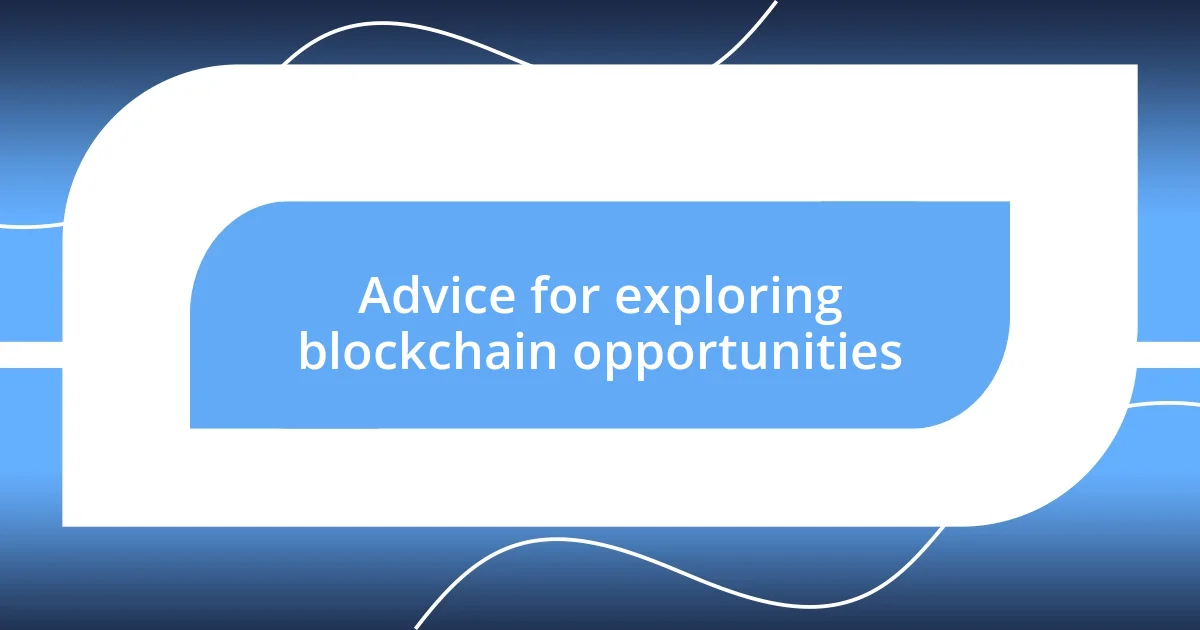
Advice for exploring blockchain opportunities
Exploring blockchain opportunities opens doors to innovative thinking. I recall attending a tech conference where a young entrepreneur pitched her blockchain-based solution for real estate transactions. It was inspiring to see how she envisioned creating a secure and transparent process that could eliminate the lengthy paperwork typical in the industry. How cool would it be to buy a home with just a few taps on your smartphone?
As you dive deeper into blockchain, consider focusing on areas that align with your passions or expertise. I once collaborated with a team looking into blockchain’s potential in the arts, specifically for verifying the authenticity of digital art. It was eye-opening to discover how artists could gain more control over their creations, fighting against counterfeiting with the help of NFTs. When you find a niche that speaks to you, the exploration becomes not just a job but a journey you genuinely enjoy.
Don’t shy away from experimenting with small projects. During my stint with a startup, we launched a pilot program using blockchain to manage charity donations. The experience taught us valuable lessons about transparency and trust, which greatly resonated with our supporters. Imagine the impact of turning your ideas into real-world applications; it’s not just about learning but also about making a difference, and that’s what motivates me to explore further.












